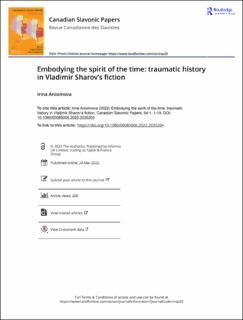Embodying the spirit of the time: traumatic history in Vladimir Sharov’s fiction
Journal article, Peer reviewed
Published version

Åpne
Permanent lenke
https://hdl.handle.net/11250/2996478Utgivelsesdato
2022Metadata
Vis full innførselSamlinger
Sammendrag
This article focuses on two novels by Vladimir Sharov, Staraia devochka (The Old Girl) and Voskreshenie Lazaria (The Resurrection of Lazarus), that address the Stalinist repressions of the 1930s. Through analysis of these novels, the article examines two interrelated aspects of Sharov’s works: their representation of traumatic history and their postmodernist style. The paper then examines the way these features of Sharov’s prose relate to broader, current cultural trends. Sharov’s novels contain a synthetic view of history that unites such incompatible elements as Orthodox Christianity, a variety of charismatic sects, Bolshevik ideology, and Stalinism. Despite Sharov’s unconventional view of the Soviet past, the article argues that there are parallels between the official, contemporary view of Soviet history and that represented in Sharov’s fiction. Both depict Russian history as unique, separated from global historical processes.
